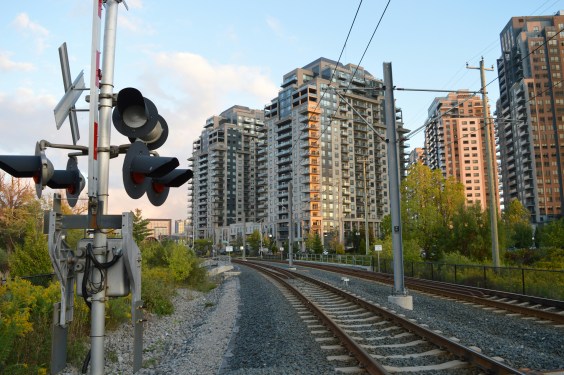 The Clipper Card readers at the Lake Merritt BART Station. Photos: Matthew Roth.
The Clipper Card readers at the Lake Merritt BART Station. Photos: Matthew Roth. One development lost in the media feeding frenzy around the Federal Transit Administration (FTA) denying BART's request of $70 million for the Oakland Airport Connector (OAC) was a letter the FTA sent to the Metropolitan Transportation Commission (MTC), the Bay Area's planning body, initiating a review of its civil rights policies [PDF].
In the February 3rd letter, FTA Office of Civil Rights Director Cheryl Hershey argued that MTC relied on BART's assurances that it had conducted proper equity and fare analysis for the OAC, but there wasn't evidence the MTC had a mechanism in place to check the veracity of BART's claims. Given that the FTA subsequently found BART's civil rights policies inadequate, the federal agency wanted MTC to produce documentation to explain its policy on civil rights adherence by fiscal subrecipients like BART.
Hershey noted that despite public testimony by Bob Allen of Urban Habitat at an MTC meeting on July 8, 2009 and a subsequent letter warning of BART's "failure to produce the required equity analysis for this project," the MTC proceeded with support for the OAC.
In the letter, Hershey wrote:
As you are aware, BART is a subrecipient of the MTC, and, therefore, MTC is responsible for ensuring its subrecipients comply with Title VI, the DOT Title VI regulations, and FTA Circular 4702.1A. Your agency is responsible for documenting a process that ensures that all MTC subrecipients are in compliance with the reporting requirements of FTA C 4702.1A
The fact that BART has not conducted the necessary service equity analysis for the OAC project or fare equity analysis raises concerns that your agency does not have procedures in place to monitor its suprecipients.
MTC responded to the FTA's investigation a month later [PDF] with a long list of subrecipients for FTA grants and made the crucial argument that many categories of FTA funds that go through the MTC, including the $70 million of stimulus funds in question for the OAC, go to recipient agencies (as opposed to "subrecipient") that have to assume responsibility for complying with FTA civil rights guidelines on their own.
At the MTC Commission monthly meeting today, MTC Executive Director Steve Heminger told Streetsblog he stood by his interpretation of the FTA guidelines for the OAC money and a number of other categories, though he said the FTA has yet to respond to the MTC's letter and the review is still open.
"We haven't heard back from them," said Heminger. "So I think the ball is in their court."
 Click to enlarge. Map of transit headway, where blue is an increase in dealy between routes and red is a decrease. Image: MTC.
Click to enlarge. Map of transit headway, where blue is an increase in dealy between routes and red is a decrease. Image: MTC. Transit Sustainability Project and the Clipper Card
Heminger also updated his commissioners at the meeting on the launch of the Transit Sustainability Project, a regional study to determine how the MTC could promote the consolidation of transit service among the 26 Bay Area transit operators and make existing service more cost-efficient.
Heminger called the project a "big deal" and noted that the transit agencies he'd met with were not exactly thrilled with the study.
"I think
it's fair to say there is a fair amount of nervousness among the transit
operators and a fair amount of defensiveness," Heminger told his commissioners.
Heminger also pointed to a new map the MTC compiled that shows transit headways from 2006-2009, where service to customers had declined particularly acutely in the East Bay. The data didn't reflect the last year, as agencies like the San Francisco Municipal Transportation Agency (SFMTA), which runs Muni, recently instituted 10 percent cuts.
"What we have found
collectively is that we're on an unsustainable path and the purpose is
to put these agencies on a stable footing," said Heminger, comparing transit service to an accordion, with increases during good economic times, decreases during bad. "That doesn't do the agencies or their
customers much good."

The other notable item on the MTC's agenda was an update on the transition from Translink to the newly branded Clipper card, a payment card used on any transit operator participating in the program, which includes most of the larger operators in the Bay Area. SamTrans and the Valley Transportation Authority are the notable agencies that have yet to adopt the cards, though both are moving in that direction.
MTC spokesperson Randy Rentschler told Streetsblog the rationale for re-branding the cards had to do with how "technological" the word "TransLink" sounds.
"Many of these cards around the world are kind of whimsically named," said Rentschler, noting the analogous card in London is called the Oyster, in Hong Kong the Octopus and in Seattle the Orca. "Clipper kind of emerged because it has an association with the Bay Area, not just because of the Clipper ships but because of the Clipper planes," said Rentschler.
The overall transition to a replicable smart card across the agencies cost $1.8 million, according to Rentschler, of which the late transition to "Clipper" was $500,000. The cards will be activated on June 16th and some operators, such as BART, had already adopted the new branding in some stations.
The only concern Rentschler had with the new logo was that there are only eight triangles and there are nine counties in the Bay Area. Rentschler wouldn't speculate which county had been left out.





